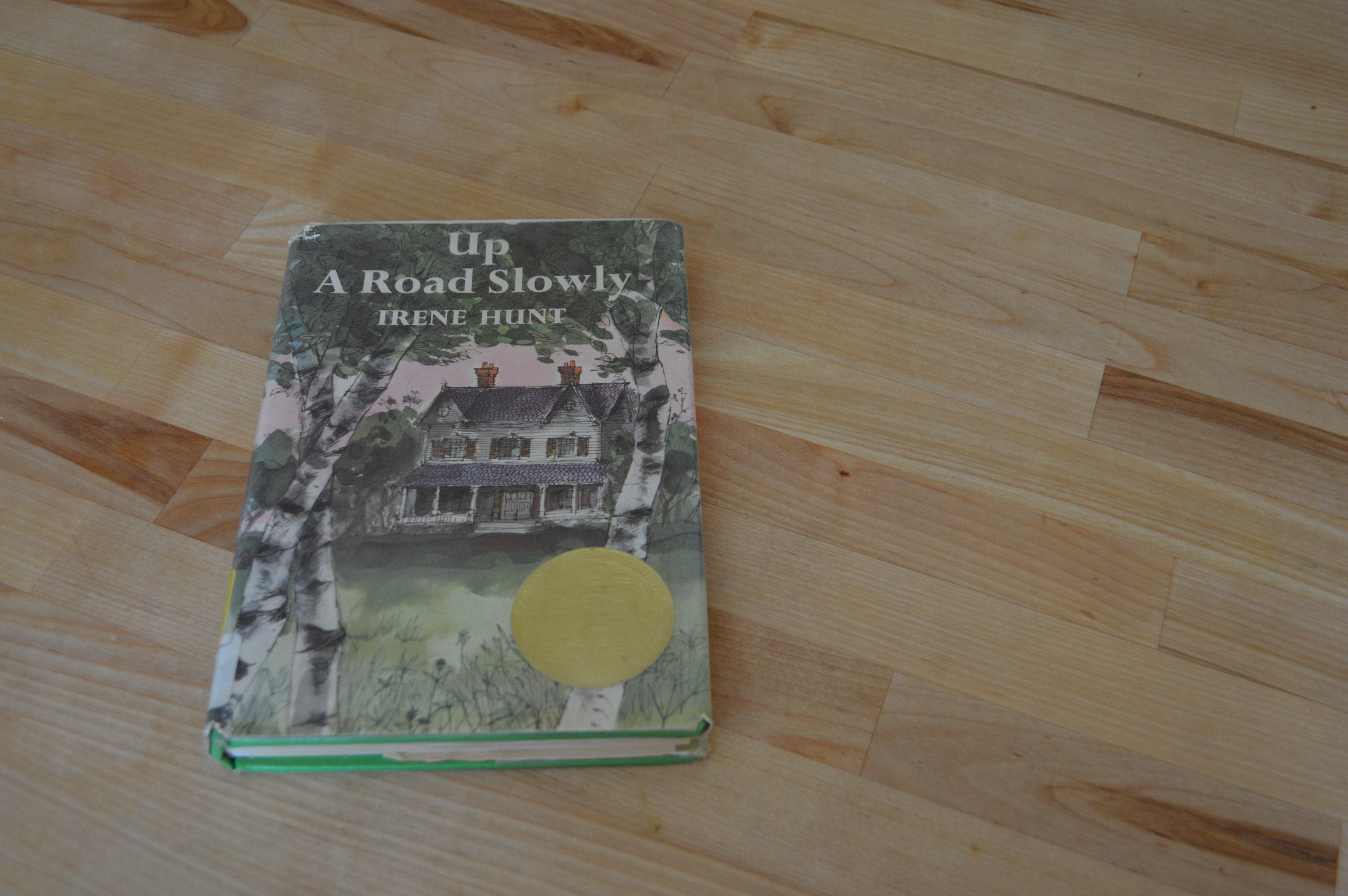
The 1967 Newbery, Up A Road Slowly by Irene Hunt is a portrait of seven-year-old Julie who, upon her mother’s death, goes to live with her Aunt Cordelia in the country. The novel traces Julie’s childhood from wild grief and disdain for her proper schoolmarm Aunt to the threshold of adulthood at age seventeen. Hunt paints a picture of a family filled with deeply hurt people who all try in their own ways to shelter and guide Julie. Just like Irene Hunt’s more famous book about the civil war, Newbery Honor book, Across Five Aprils, Hunt’s strength as an author lies in creating families that grow over time.

What I liked and what it taught me as a writer. I think the characters are the strongest part of this book. Alcoholic writer Uncle Haskell giving advice to Julie at the end reminds her that no character is all good or all bad, that everyone has a bit of both in them and a writer’s job is to capture that. Uncle Haskell is a great example of this, because he’s extremely unlikable and somehow you come to care about him despite his selfish self-delusions. Hunt does this through both revealing back story and letting the characters redeem themselves by offering aid to someone (usually Julie, but sometimes someone she cares about), all while still keeping up their gruff and flawed exteriors.

What was interesting. I think that the underlying (almost hidden) sexual ethics of the book are very interesting, showing both the positive and negative bits of mid-20th century sexual ethics. One incident early in the book when Julie was 7 or 8 has Julie’s brother and his best friend Danny hold her down so Danny can complete a dare to kiss her. Julie punches Danny. Aunt Cordelia hears about the incident and yells at Julie for punching Danny. And while Aunt Cordelia later relents that she was being harsh, I had a hard time reading that particular injustice, since while I am usually not a fan of punching, I think if you’re held against your will and kissed, you are very much within your rights to be able to fight to get away, and we should be teaching children that. On the other hand, at the very end of the book, there is a roundabout reference to Julie’s ex-boyfriend Brett (and what an amazing portrayal of a terrible high school boyfriend and all the feelings that go along with that) getting a girl pregnant. We also learn how it ruined that girl’s (Carlotta) life, how her parents were so ashamed, and how lucky Julie was to get out of Brett’s clutches (he was using her to write his English papers for him) since that could have been her. The gravity of teenage promiscuity was so pronounced (and really probably the first time a Newbery even mentions it) and not even something that adults were condemning; it was the other teenagers discussing it. It really struck me as something that I agreed with (the gravity of it, not necessarily the bleakness of Carlotta’s future), but that seems pretty out of step with the way teenage sexuality is often handled in contemporary YA fiction. (For example. I recently read and loved Tell Me Three Things and When Dimple Met Rishi, both of which have great strong characters with solid ethics, but definitely treated teenage sexuality lightly.)

What were some limitations. The narrator’s voice (both the written and the audio-narrator’s voice) were probably the biggest limitation(s) to this book. It’s hard to put my finger on exactly what it is that left me with an impression of simultaneously stilted-formal tone and at the same time an overly-dramatic diary of a girl. Eventually, I either got used to it, or Julie’s character matured, so that by the end I really enjoyed the book. One thing that was strange about it was that I couldn’t quite place the setting: there were cars and winter, so it seemed like mid-20th century eastern North America, but I never could put my finger on whether it was supposed to be set in the 60s (since it was written in the 60s) or more like the 20s, and I never got more than a sense that it was in the north-eastern part of the US. I suppose that could have been an intentional decision, but it was kind of annoying.

Similarity to other Newbery winners. Really this book mostly reminded me of an LM Montgomery book, like Anne of Green Gables or Emily of New Moon but without LM Montgomery’s distinctive and wonderful voice. (No offense to Irene Hunt, I mean no one else can write coming of age novels about spunky girls growing up with aunts like LM Montgomery can). But in terms of other Newberies with similarly strong female protagonists, I would compare it to The Witch of Blackbird Pond, Wrinkle in Time, Miracles on Maple Hill, Caddy Woodlawn, Invincible Louisa, and Strawberry Girl.

Have you read Up A Road Slowly? What are your favorite books about strong female protagonists growing up?
*Note* This post contains Amazon affiliate links, which means if you were to buy a book, I’d get a tiny commission at no cost to you. Thanks for supporting Stories & Thyme!*
